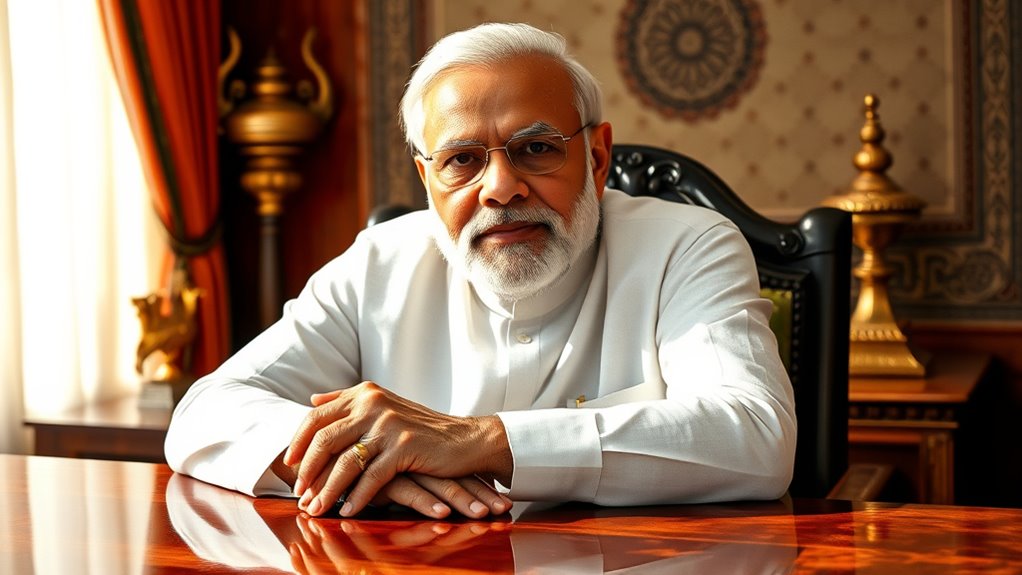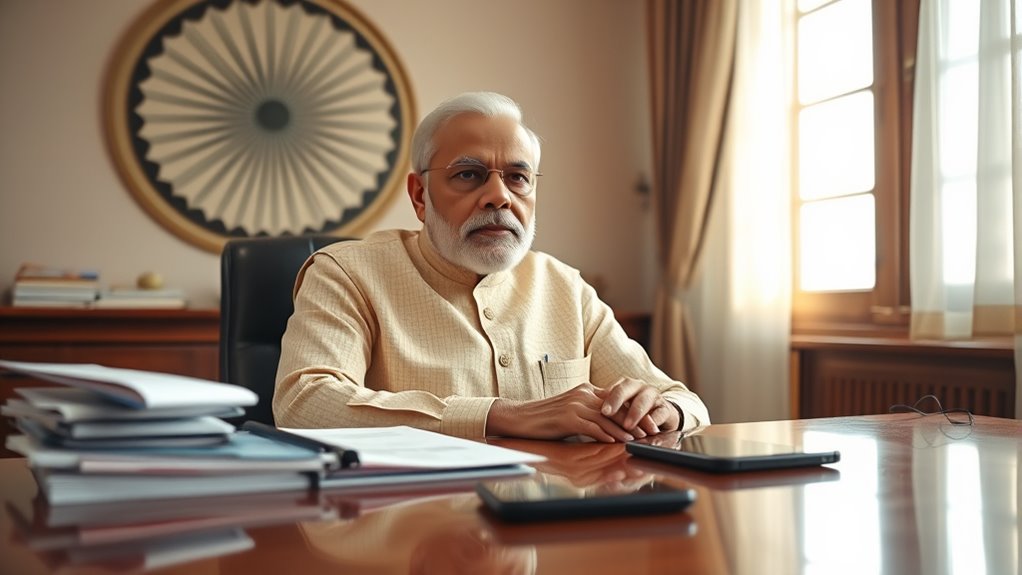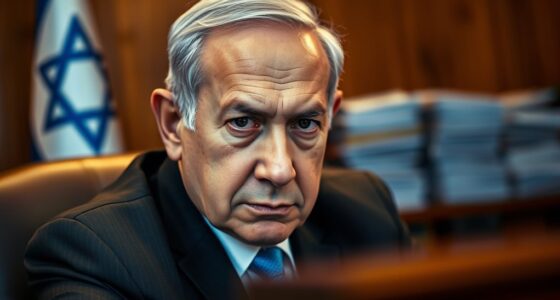Narendra Modi’s declared assets show a modest financial profile, reflecting transparency expected of India’s Prime Minister. His assets mainly include savings, bank deposits, and some immovable property, consistent with his income from public service. While some might expect more wealth, his disclosures emphasize accountability and honesty. If you want to understand what these declarations reveal about his financial integrity and how they compare to others, keep exploring the details behind his assets.
Key Takeaways
- Narendra Modi’s declared assets mainly include savings, bank deposits, and immovable property, reflecting his modest financial profile.
- His wealth is consistent with his income from government service and personal sources, emphasizing transparency.
- Asset declarations promote accountability and help prevent illicit wealth accumulation among public officials.
- Modi’s rise from humble beginnings underscores the importance of transparent asset reporting in maintaining public trust.
- Regular disclosure of assets ensures continued government transparency and reinforces commitment to anti-corruption measures.

Narendra Modi’s assets have been a topic of interest and scrutiny, especially given his position as India’s Prime Minister. As a public figure with significant political influence, people closely watch his declared wealth to assess transparency and integrity. You might wonder how much wealth he has accumulated and whether his assets align with his public service role. The Indian government requires high-profile officials like Modi to declare their assets regularly, aiming to promote transparency and prevent corruption. This declaration helps the public understand how political influence might translate into personal wealth, which is a pivotal aspect of accountability in a democratic setup.
When you look at Modi’s declared assets, you’ll notice a relatively modest portfolio compared to other world leaders. His wealth primarily includes savings, bank deposits, and some immovable property. The transparency in his wealth declaration aims to clarify that his financial standing is consistent with his known income from government service and his personal commitments. This transparency is essential because it builds trust among citizens who want assurances that their leader isn’t amassing wealth through illicit means. It also pressures other politicians to follow suit, fostering a culture of openness.
Modi’s modest assets reflect income transparency and promote trust in Indian political leadership.
You might also consider that Modi’s political influence plays a role in how his assets are perceived. His rise from humble beginnings to the highest political office illustrates a journey of significant influence, which naturally sparks debates about the balance between power and wealth. Critics often question whether political influence can lead to undue accumulation of assets, while supporters argue that his declared wealth is justified based on his savings and assets accumulated over years of public service. The key is that the declared wealth must be scrutinized in the context of wealth transparency, ensuring that no hidden assets or illicit gains are involved.
Additionally, the government’s requirements for asset declarations are part of a broader effort to enhance transparency and accountability in governance, which is crucial for maintaining public trust and fighting corruption. In essence, Modi’s declared assets serve as a reflection of his financial integrity and the broader efforts toward transparency in Indian politics. You can see that the government’s requirement for asset declarations aims to curb corruption and promote honest governance. While no leader’s wealth is entirely immune to suspicion, consistent and transparent declarations help maintain public trust. As India continues to evolve politically, the focus on political influence and wealth transparency remains essential, ensuring that leaders like Modi are held accountable and that their assets are openly scrutinized by the public and watchdog organizations alike.
Frequently Asked Questions
Has Narendra Modi’S Net Worth Increased Significantly Over the Years?
You might wonder if Narendra Modi’s net worth has grown considerably over the years. His wealth growth appears steady, but it’s essential to take into account financial transparency in his declarations. While some see an increase, others believe it’s within reasonable bounds. You should stay informed about the updates in his asset disclosures, as transparency helps you assess how his wealth changes over time and whether it aligns with his official income and position.
What Are the Sources of Narendra Modi’S Income?
You might wonder about Narendra Modi’s income sources. His main income comes from his government salary as Prime Minister, which is publicly disclosed. Additionally, he receives campaign donations for his political activities. Modi’s wealth isn’t derived from business ventures or investments but primarily from his official government salary and donations he receives during election campaigns. These sources help maintain transparency about his declared income and assets.
Does Narendra Modi Own Any Property Abroad?
You might wonder if Narendra Modi owns any foreign property or has offshore accounts. According to his declared assets, he doesn’t report any foreign property or offshore accounts. He primarily owns Indian assets, including land and savings. It is worth mentioning that public officials are required to disclose such information, but there’s no evidence suggesting Modi holds foreign property or offshore accounts at this time.
How Does Narendra Modi’S Wealth Compare to Other Indian Politicians?
Your curiosity about how Narendra Modi’s wealth stacks up against other Indian politicians reveals a complex landscape. While some view his assets as modest, political rivalry often fuels debates on transparency. His declared wealth shapes public perception, with many believing he’s more grounded than peers. Compared to others, Modi’s wealth appears relatively controlled, but the perception of wealth influences voter trust and confidence, making it a critical aspect of political discourse.
Are There Any Undisclosed Assets or Liabilities in Narendra Modi’S Wealth?
You wonder if there are undisclosed assets or liabilities in Narendra Modi’s wealth. Transparency concerns often arise when asset verification isn’t fully clear, making it hard to confirm if all assets are declared. While Modi has publicly disclosed his wealth, some skeptics question whether all liabilities are revealed. Ultimately, without exhaustive audits, it’s difficult to determine if any hidden assets or debts exist, fueling ongoing debates about transparency.
Conclusion
In understanding Narendra Modi’s wealth, you glimpse a leader balancing public trust with personal responsibility, much like a captain steering through stormy seas. His declared assets remind you that transparency isn’t just about numbers, but about the integrity of a nation’s confidence. Just as a lighthouse guides ships safely ashore, his financial disclosures serve as a beacon, urging you to seek truth and uphold accountability in every facet of leadership.









